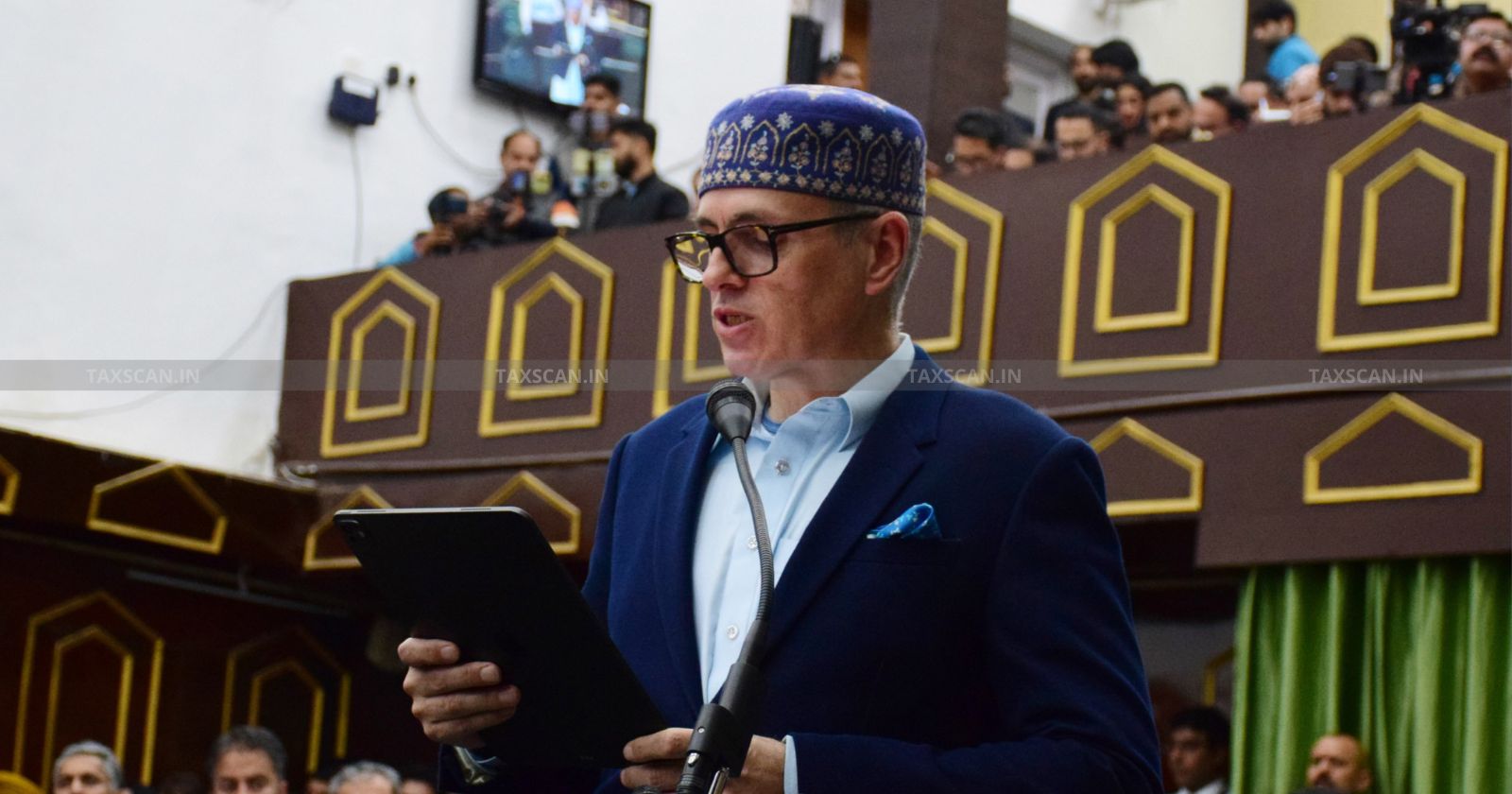J&K Budget 2025: CM Omar Abdullah Presents First Budget Since 2018, Says 60% Revenue Spent on Salaries & Pensions
J&K CM announced 200 units of free electricity per month for low-income families, Rs. 850 crores allocated to the agriculture sector, 285 smart schools, and 25 new hostels

J&K Budget 2025 – CM Omar Abdullah – J&K Budget 2025 highlights – TAXSCAN
J&K Budget 2025 – CM Omar Abdullah – J&K Budget 2025 highlights – TAXSCAN
Jammu and Kashmir Chief Minister and Finance Minister Omar Abdullah presented the first budget since 2018 by an elected government, outlining the region’s financial situation, challenges, and future plans.
He highlighted that salaries and pensions alone make up nearly 60% of the government’s revenue spending and over 70% of total spending goes toward fixed expenses, leaving limited funds for development and new projects.
Abdullah explained that Jammu and Kashmir face severe financial stress due to limited revenue sources, its geographical challenges, and past unrest, which have slowed industrial growth and increased dependence on central government support and loans.
Know Practical Aspects of Tax Planning, Click Here
Key Highlights of the J&K Budget 2025
1. Revenue Growth & Financial Management
To reduce financial stress, the government is focusing on improving tax collection, cutting unnecessary spending, and ensuring more financial transparency. Some of the major steps taken include:
- Better GST tracking and e-stamping for registrations to increase tax revenue and reduce fraud.
- Strengthening tax monitoring systems to track businesses more effectively.
- Non-tax revenue increased to Rs. 5,824 crore as of January 31, 2025, and tax revenue reached Rs. 11,650 crore, which is higher than last year’s collection.
- Introduction of AI-based tracking systems and risk-based tax verification to prevent tax evasion.
2. Power Sector Reforms & Debt Reduction
Jammu and Kashmir’s power sector has been a major financial burden, with large-scale electricity losses due to outdated infrastructure and unpaid bills. Abdullah said the government is working to fix this problem by:
- Expanding the number of paying consumers to increase revenue from electricity bills.
- Installing smart meters and introducing online billing systems to ensure people pay for the electricity they use.
- Replacing old electricity cables with aerial bunched cables to prevent power theft.
- The government has already reduced financial losses from Rs. 6,552 crore in 2022-23 to Rs. 5,244 crore in 2023-24, and aims to bring it down further to Rs. 4,200 crore in 2024-25.
- However, due to past unpaid electricity bills, Jammu and Kashmir had to borrow Rs. 28,000 crore in recent years, increasing public debt from 48% of the Gross State Domestic Product (GSDP) in 2015-16 to 52% in 2023-24.
- The government now plans to reduce costly loans, manage existing debts better, and reschedule repayments to stabilize its finances.
Know Practical Aspects of Tax Planning, Click Here
3. Welfare & Public Services
Despite financial challenges, Abdullah announced several welfare measures to support the people of Jammu and Kashmir, including:
- 200 units of free electricity per month for low-income families.
- 10 kg of free ration per person for those in need.
- Free bus travel for women in government-run buses to improve mobility and safety.
- Rs. 850 crore allocated to the agriculture sector, which is expected to create 2.88 lakh jobs.
- 285 smart schools and 25 new hostels to improve education and provide better learning facilities for students.
4. Infrastructure & Development Plans
The government aims to invest in infrastructure projects to boost economic growth and tourism, including:
- Completion of seven new solar power projects to promote renewable energy.
- Better road connectivity, water supply, and sewerage systems to improve public infrastructure.
- New tourism projects to attract visitors and generate more jobs.
- Development of world-class sports infrastructure to make Jammu and Kashmir a hub for athletes and sporting events.
Read More: Income Tax Bill 2025: What Every Family Needs to Know About Clubbing of Income [Read Bill]
5. Strengthening Financial Transparency & Governance
The administration has introduced:
- Aadhaar-based verification to ensure that government welfare benefits reach only the eligible citizens.
- Public access to government spending records on the Jan-Bhagidhari (Empowerment) Portal so that people can track how funds are being used.
- Independent officers are assigned to monitor projects and prevent corruption and delays.
Central Government Assistance & Budget Changes
- The budget for Jammu and Kashmir’s Police Department (which accounts for 11% of total spending) has been moved to the Ministry of Home Affairs (MHA) from 2024-25 onwards.
- The Central Government has approved an additional Rs. 5,000 crore in grants for J&K for 2024-25 and 2025-26 to support its financial needs.
Know Practical Aspects of Tax Planning, Click Here
Future Economic Outlook
- J&K’s economy is expected to grow by 7.5% in 2024-25, and the Gross State Domestic Product (GSDP) is projected to grow by 9.5% in 2025-26.
- The fiscal deficit is expected to shrink, aligning with Fiscal Responsibility and Budget Management (FRBM) targets.
Conclusion
The first budget of an elected J&K government since 2018 comes at a time when the region faces financial difficulties due to high committed expenses and growing debt. The coming months will determine if the budget truly delivers on its promises and sets Jammu and Kashmir on the path to sustainable growth.
Support our journalism by subscribing to Taxscan premium. Follow us on Telegram for quick updates


